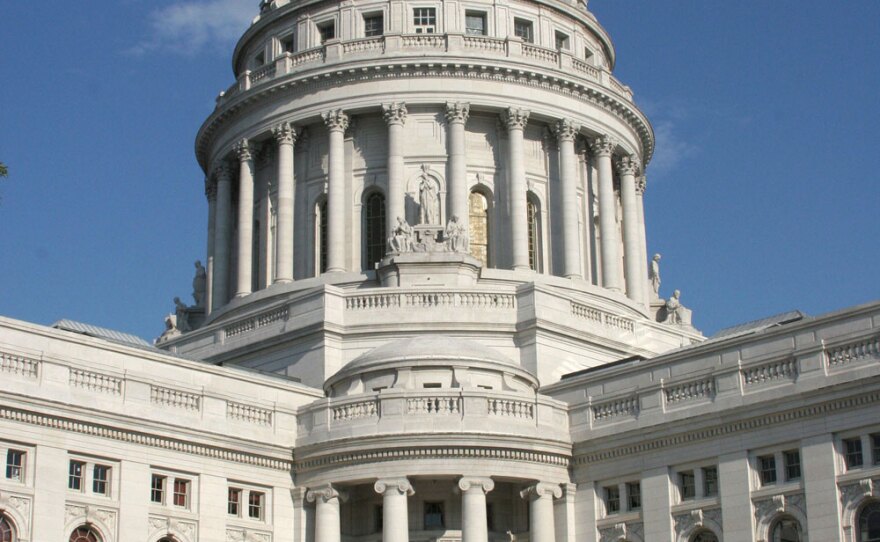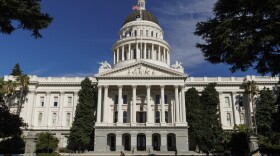Scott Fitzgerald is starting to like his chances. He's the Republican leader in the Wisconsin state Senate, and his party needs to win just two seats this November to regain control of the 33-seat chamber.
When the year began, Fitzgerald worried that it might be tight. He figured there were only three seats realistically in play. As the year has progressed, however, polling has indicated that twice as many may be within Republicans' reach.

The state Assembly, which went Democratic two years ago, may switch back as well. So might the governorship.
And while Wisconsin is a bit unusual in having all of the seats of power ripe for takeover by Republicans, the GOP is looking at plenty of pickup opportunities in state legislative elections from coast to coast.
It's conceivable that Republicans could take over as many as 20 chambers this fall. Conversely, it's difficult to name more than a handful of states where Democrats could win control.
"It's not exactly going way out on a limb to say this is a challenging election for Democrats," says Tim Storey, an elections expert with the National Conference of State Legislatures. "That's fairly obvious."
Big Republican gains in November could have lasting consequences. Legislators elected in the fall will redraw congressional boundaries next year. Control over the redistricting process could sway outcomes in dozens of districts over the next decade.
"If you're going to have a good year, have it in a year that ends in zero," says Ed Gillespie, a former Republican Party chairman who is heading up the GOP's state-level efforts this year.
Playing On Democratic Turf
Part of the reason is simple math. Democrats are offering up many more targets.
About 6,000 of the nation's 7,400 legislative seats are at stake this fall. Democrats currently hold 55 percent of the total. The party also controls 60 chambers nationwide, compared with 36 that are held by Republicans. (Two are tied and one – Nebraska's -- is nominally nonpartisan.)
Democrats have scored gains in both legislative seats and chambers three election cycles in a row -- 2004, 2006 and 2008. They won many marginal seats that they'll have a hard time holding this year.
"You're building on three cycles of Democrats gaining seats," says Josh Goodman, a political reporter and blogger with Governing, a state and local government magazine. "If Democrats didn't win a seat in those three years, when would they ever win it?"
Difficult Year For Incumbents
Given that the president's party almost always loses seats during midterm elections -- and that Democrats have few places left where they can realistically go on offense -- Republicans would be likely to make gains under almost any circumstances.
An average of a dozen legislative chambers change hands every election cycle. It's especially tough to be running as the party in power in most states this time around.
States have had to fill budget shortfalls totaling about $300 billion over the past couple of years, meaning legislators have done almost nothing but cut spending or raise taxes, or both. They don't have a lot of shining recent policy breakthroughs they can brag about.
"This recession has made it difficult for anyone to govern and make everyone happy," says Michael Sargeant, executive director of the Democratic Legislative Campaign Committee.
What's At Stake?
In addition to the usual business that makes legislative control important -- setting budgets, crafting education or transportation policy -- this year's election holds particular significance because of its effects on redistricting.
After each decennial census, each state redraws the lines setting state legislative districts -- and those of House members in Congress. That job falls in most states to legislatures and the governor.
Choosing the mix of voters within each district will have a major impact on which party is likely to succeed for years to come. That's why both parties have tasked top strategists and are raising hundreds of millions of dollars to influence legislative elections in key states.
"Some of the dollars that are going to have influence in this cycle are dollars coming out of D.C.," Wisconsin Sen. Fitzgerald says, "which I've never seen in the years I've been in the legislature."
Officials with both parties believe that the partisan leanings of as many as 25 House districts will be shaped by the redistricting process. After Texas Republicans took control of the state legislature in 2002, they engaged in an unusual and controversial re-redistricting. The result was that their party picked up an additional five House seats in 2004.
After the 2000 election, Storey says, Democrats had complete control over redistricting 40 more House seats than Republicans nationwide. Following this year's election, depending on which way several contested chambers fall, Republicans could have complete control of redistricting decisions for 100 or more seats than Democrats.
"If the wave goes all in the Republican direction, it could have huge ramifications," Storey says. "It could have a massive long-term impact on control of Congress."
The Importance Of Quality Candidates
Sargeant, the Democratic campaign official, notes that in 2004, his party made gains at the legislative level even as it was losing the White House and seats in Congress.
"Democrats have been successful in running for state legislatures and gaining majorities based on the strength of their campaigns and how they speak to the concerns of their district," he says. "Democrats work very hard to personalize and localize these campaigns."
It's an article of faith that retail politics still matter at the legislative level. Candidates spend hours every day knocking on doors. In many states, districts include just a few thousand people. Campaigns carefully target voters who are likely to support their cause, or who are at least persuadable. It's possible a candidate will have the chance to make his case personally to just about each potential supporter.
Sending A Message
But that may not be enough. Most people don't follow legislative elections as closely as congressional races. If there's a big enough Republican wave, many will vote against the president's party at the state level to send a message to Washington.
Robin Vos, a Republican member of the state Assembly in Wisconsin, says that he mouthed, and sincerely believed, many of the same talking points in 2006 that Democrats are using now -- that the party has good candidates with deep roots in their communities who will be able to withstand national trends.
Vos recalls that Republicans sustained heavy losses that year, in Wisconsin -- losing the state Senate -- and nationwide. "It was mostly about Iraq and frustration in Washington, but people certainly took it out on Republicans at all levels," Vos says.
He now expects that history will repeat itself -- in his party's favor. Certainly many other Wisconsin Republicans believe that this is the right year to run. The party attracted more legislative candidates in time for Tuesday's filing deadline and left fewer Democratic seats uncontested than anyone in Madison seems able to recall.
"A lot of Democrats are in office because they won by a handful of votes," says Joseph Strohl, a former Wisconsin Senate Democratic leader who now lobbies in Madison.
"In reality, it doesn't take a lot of shift in voter attitude to shift chambers."
Copyright 2022 NPR. To see more, visit https://www.npr.org. 9(MDAzMjM2NDYzMDEyMzc1Njk5NjAxNzY3OQ001))






